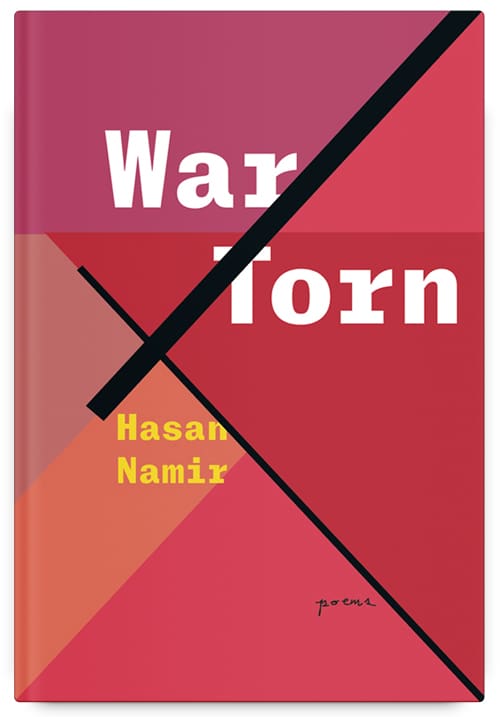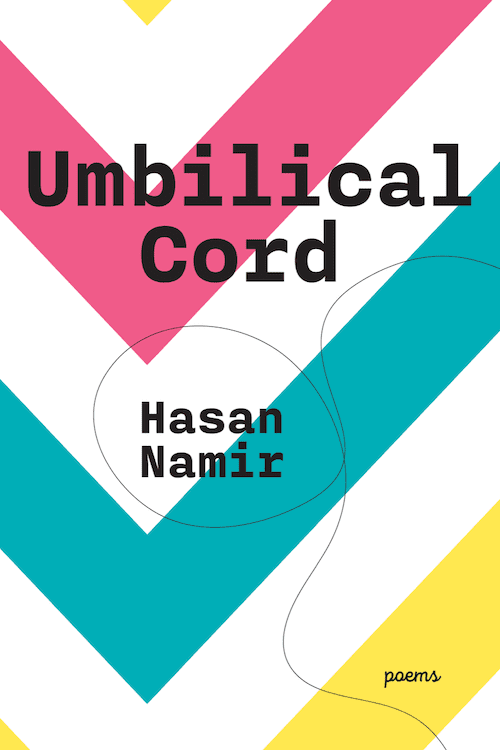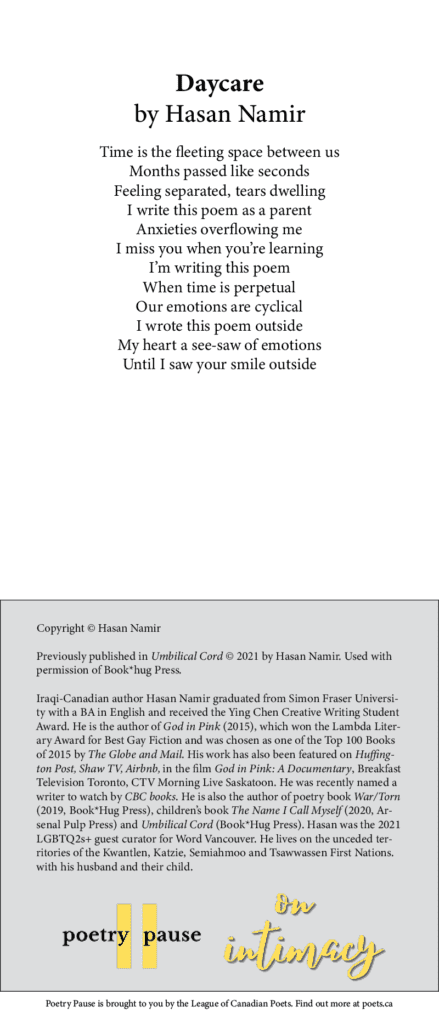NPM22 Blog: We Speak in Poetry by Hasan Namir
Dear reader,
If you are reading this, you’re either a poet or someone who appreciates and enjoys reading poetry. Or maybe you’re not a big poetry fan but you want to be. Or maybe you have a love-hate relationship with poetry. And to be honest, I don’t blame you. Whatever your relationship with poetry is, it’s certainly valid. When I was a teenager, I always thought that poetry is lyrical and the last words in each line had to rhyme with the following last word on each line. I would write poetry when I was feeling sad and lonely and had no one to talk to. The words would fill the paper as the tears fell down my cheeks. I would cry and cry some more. I would print the poem and gave it the biggest hug like it was a teddy bear. It gave me some comfort. I was scared and afraid to share my words with anyone. During these years, I was struggling to accept who I was and I was afraid that my parents and some of my family would not accept me. I was bottling my fears and traumas inside. My poetry at the time was private.

When I graduated from high school and started attending Simon Fraser University, I knew I wanted English Literature to be my major. I took a lot of courses in which I studied poetry. I struggled to understand and appreciate medieval poetry and Old English poetry. I had an estranged relationship with that kind of poetry. I didn’t understand and appreciate some of the poems as the words sounded foreign. In writing academic papers, I struggled to understand and make sense of the poetry I was reading. Thus, as you can guess, dear reader, my academic papers weren’t graded as well as I wanted them to be. I started to question my own poetics. Was my poetry not valid because the words were too simplistic in comparison to the poets’ works that I read?
In my university career, I was interested in enrolling in creative writing classes as I always loved writing. There was a course, English 472–Advanced Creative Writing (Poetry), taught by the incredible award-winning author Jordan Scott. The prerequisite was that I had to have taken English 372, which I hadn’t. There was an option to surpass the prerequisite by sending Jordan a sample of poems. I sent him some poems I’d written in the past and it was my first time sharing my poems with anyone. I wasn’t afraid this time and I was comfortable sharing them with Jordan. To my pleasant surprise, he allowed me to enroll in the course but he set an expectation that he was going to challenge me. And he was absolutely right, the course was one of the best things that happened to me. It allowed me to write in free verse, experiment with form and words to create meaning that I as a writer thought would be appropriate to tell my story. At the time, I was still struggling to come in terms with my sexuality and I was struggling to live my authentic life with my family. As an Iraqi-Canadian Muslim man, I loved my culture, religion and family so much. I didn’t want to lose any of that but at the same time, I knew I was queer and I knew I was attracted to men. In the course, I learned to be more open with my poetry. I learned to share my work and be open to criticism and any feedback that would be given to me.

I learned to love poetry and my poetics. I was writing in a hyphenated language that made the most sense to me: reconciling between my languages which were Arabic and English. I continued to experiment with languages and forms and the act of writing was healing me slowly. I channeled my struggle in reconciling between myself, my sexual orientation, my identity, my religion and my culture through the words. I was able to write intimately and I managed to complete a manuscript by the end of the course. That manuscript eventually became my first poetry book War/Torn which was published by my wonderful publisher Book*hug Press in 2019.
As I was working on the earlier drafts of the book, I kept asking myself if the poems were accessible. I was concerned if the poetry brought the readers closer to the poetics or not. I was afraid that since many the poems had a lot of Arabic words written in English, that there would be a wall keeping a distance between me and you, the reader. I was conscious about how much of me I wanted to share and how much of me I wanted to keep to myself. At times, I was scared and afraid, wondering about you and what you might think of my work. I was wondering about all kinds of yous. What would you think of me? What would you think of my work? I was afraid of being perceived with judgment. At the same time, I knew I had a mission to heal myself and the only way to do that was through writing poetry.
Poetry was the only platform that gave me the comfort to be transparent and intimate. Poetry set me free because I was in control of my story. I had the capability of sharing enough but not sharing beyond my comfort zone. I was able to withhold names, share specific instances of my life in a way that made sense to me. With War/Torn, it wasn’t just my story, it was the stories of many oppressed queer people in the Middle East and other parts… it was about all of our struggles, the poems gave voices to the voiceless and the “othered.” The poems in the book translated my feelings and what I was going through at the time.
As things in my life began to change, so did my poetics. In 2019, dear reader, my husband Tarn and I knew we really wanted to have a baby. We were together for many years. We loved each other so much and we wanted to have to start a family together. We knew we were ready. We were hoping to find a surrogate that would help us make our dream a reality. One day, I remembered that my sister-in-law Kiran had offered to be our surrogate when we got engaged and then once again when we got married. We called her and asked her one morning. She immediately said “yes.” At the time, I was already thinking about what my next poetry book going to be about. I worried I hadn’t done my love for Tarn enough justice in War/Torn, and I knew that I wanted to make the second book about my love for him, how he helped me overcome depression and our parenthood journey. I started working on the collection as we were going through the IVF journey. I felt that I was at a point in my life in which I was comfortable to share my whole story and talk about a part in my life when I was going through situational depression. I wanted to be as open and transparent about everything as possible.
I wanted the book to be a collection of love letters to both Tarn and to Malek, our son. I wanted the book to be both personal and universal, a story of a couple who love each other so much that they want to start a family together. Umbilical Cord, also published by the wonder Book*hug Press, is unique because it highlights the surrogacy process, the parenting process, and how two men come together to raise their child.

The writing process started at the beginning of our journey, and the poems continued developing until our son Malek turned one. The writing process mirrored exactly what we were experiencing. I was also writing letters and poems that were for our son Malek. I wrote a bunch of them while my sister-in-law Kiran was pregnant. I wrote a bunch more after he was born.
I wanted the book to be non-linear like the umbilical cord, when “time is perpetual / our emotions are cyclical” (‘Daycare poem’, from Umbilical Cord). The book shifts through the past and the present like memories, highlighting important moments from my love story with Tarn: when we got engaged, when I was going through depression, when he helped me overcome it, when we got married, when we wanted to be parents, when we went through the IVF journey and our parenthood journey until Malek turned one. I didn’t want poems to follow linear order. I wanted you, my dear reader, to read the book and re-read it again and again. I wanted each reading experience to be different, mirroring my memories and how every experience of mine is different than the other.
Dear reader, for a long time, I was afraid to be let go and show my most intimate self through poetry. I managed to open up quite a bit through War/Torn, but a part of me was still afraid. I’m at my most open in Umbilical Cord. I was not afraid to write about anything. I even wrote about the death threat that I received once. I wrote it because I’m no longer afraid of anything that could hold me back from being my most authentic self. I want my poems to bring us closer. I want you to fully experience my parenthood and becoming a father. I want you to laugh, smile and cry with me. I want to share my feelings with you. I want my poems to show the ups and downs of it all in the most honest way possible. I hope you will get to know me through my words. My name is Hasan Namir, and it’s so nice to meet you!
Iraqi-Canadian author Hasan Namir graduated from Simon Fraser University with a BA in English and received the Ying Chen Creative Writing Student Award. He is the author of God in Pink (2015), which won the Lambda Literary Award for Best Gay Fiction and was chosen as one of the Top 100 Books of 2015 by The Globe and Mail. His work has also been featured on Huffington Post, Shaw TV, Airbnb, in the film God in Pink: A Documentary, Breakfast Television Toronto, CTV Morning Live Saskatoon. He was recently named a writer to watch by CBC books. He is also the author of poetry book War/Torn (2019, Book*Hug Press), children’s book The Name I Call Myself (2020, Arsenal Pulp Press) and Umbilical Cord (Book*Hug Press). Hasan was the 2021 LGBTQ2s+ guest curator for Word Vancouver. He lives on the unceded territories of the Kwantlen, Katzie, Semiahmoo and Tsawwassen First Nations. with his husband and their child.

